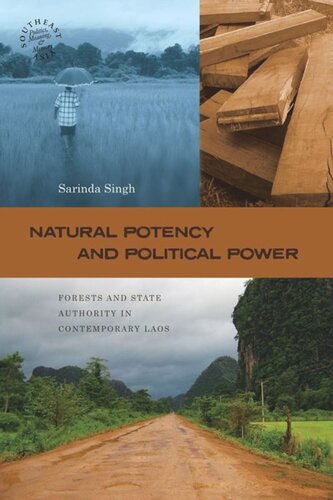

Most ebook files are in PDF format, so you can easily read them using various software such as Foxit Reader or directly on the Google Chrome browser.
Some ebook files are released by publishers in other formats such as .awz, .mobi, .epub, .fb2, etc. You may need to install specific software to read these formats on mobile/PC, such as Calibre.
Please read the tutorial at this link: https://ebookbell.com/faq
We offer FREE conversion to the popular formats you request; however, this may take some time. Therefore, right after payment, please email us, and we will try to provide the service as quickly as possible.
For some exceptional file formats or broken links (if any), please refrain from opening any disputes. Instead, email us first, and we will try to assist within a maximum of 6 hours.
EbookBell Team

4.3
68 reviewsForests, as physical entities, have received considerable scholarly attention in political studies of Asia and beyond. Much less notice has been paid to the significance of forests as symbols that enable commentary on identity, aspirations, and authority. Natural Potency and Political Power, an innovative exploration of the social and political importance of forests in contemporary Laos, challenges common views of the rural countryside as isolated and disconnected from national social debates and politics under an authoritarian regime. It offers instead a novel understanding of local perspectives under authoritarianism, demonstrating that Lao people make implicit political statements in their commentary on forests and wildlife; and showing that, in addition to being vital material resources, forests (and their natural potency) are linked in the minds of many Lao to the social and political power of the state.
Sarinda Singh explores the intertwining of symbolic and material concerns in local debates over conservation and development, the popularity of wildlife consumption, the particular importance of elephants, and forest loss and mismanagement. In doing so, she draws on ethnographic fieldwork around Vientiane, the capital, and Nakai, site of the contentious Nam Theun 2 hydropower project—places that are broadly reflective of the divide between urban prosperity and rural poverty. Nam Theun 2, supported by the World Bank, highlights the local, regional, and global dynamics that influence discussions of forest resources in Laos. Government officials, rural villagers, and foreign consultants all contribute to competing ideas about forests and wildlife.
Singh advances research on forest politics by rethinking how ideas about nature influence social life. Her work refutes the tendency to see modern social life as independent of historical influences, and her attention to viewpoints both inside and outside the state prompts an understanding of authoritarian regimes as not only sources of repression, but also sites of negotiation, engagement, and debate about the legitimacy of social inequalities.